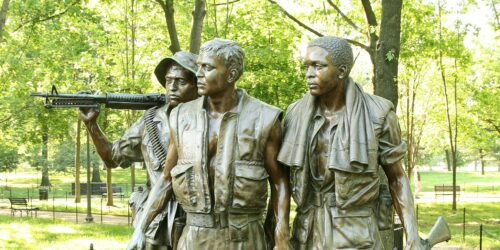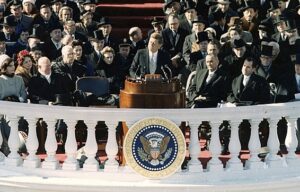
American Forces Leave Vietnam, Fifty Years Ago This Week
On March 29, 1973, the last American combat soldier, Master Sgt. Max Beilke, left Vietnam, completing the American military withdrawal. President Richard Nixon had announced on January 23, 1973 that the United States and North Vietnam had signed an agreement to end the war. Below is an introduction to Nixon’s announcement, written by Professor David Krugler, for the document collection on the Cold War he curated and edited. The collection contains eight of the most important documents on the war. The entire Cold War collection is available in the TAH bookstore for purchase or as a free PDF download.
Address to the Nation Announcing Conclusion of an Agreement on Ending the War and Restoring Peace in Vietnam
President Richard M. Nixon
January 23, 1973
Introduction
Throughout its first term, the Nixon administration struggled to end the war in Vietnam. By 1972, most U.S. troops had been withdrawn, as Nixon had promised (Document 34), but the bombing of North Vietnam continued in an effort to force its leaders to accept a peace treaty recognizing the independence of South Vietnam. By late 1972, an agreement was finally at hand; both sides accepted it in January 1973. Nixon described the agreement as “peace with honor,” but Vietnam remained in a state of war. Congress refused to fund continued assistance (economic aid and military weapons) to South Vietnam, which was unable to halt the advance of communist forces. Hampered by the growing Watergate scandal, Nixon was not able to order bombing in support of the South Vietnamese government. In April 1975, the United States evacuated its embassy in Saigon, South Vietnam, as North Vietnamese troops captured the city. The South Vietnamese government fell, and Vietnam was unified under communist rule, fulfilling the goal the Vietnamese communists had had since 1945.
The costs of the war—billions of dollars, domestic turmoil, and more than 58,000 U.S. military deaths—continued to shape U.S. Cold War policies and politics for years to come. For instance, while President Ronald Reagan later defended the war as a worthy fight, President Jimmy Carter called it an example of the “intellectual and moral poverty” of automatically resorting to military force to achieve Cold War aims (See Document 40 in this collection).



